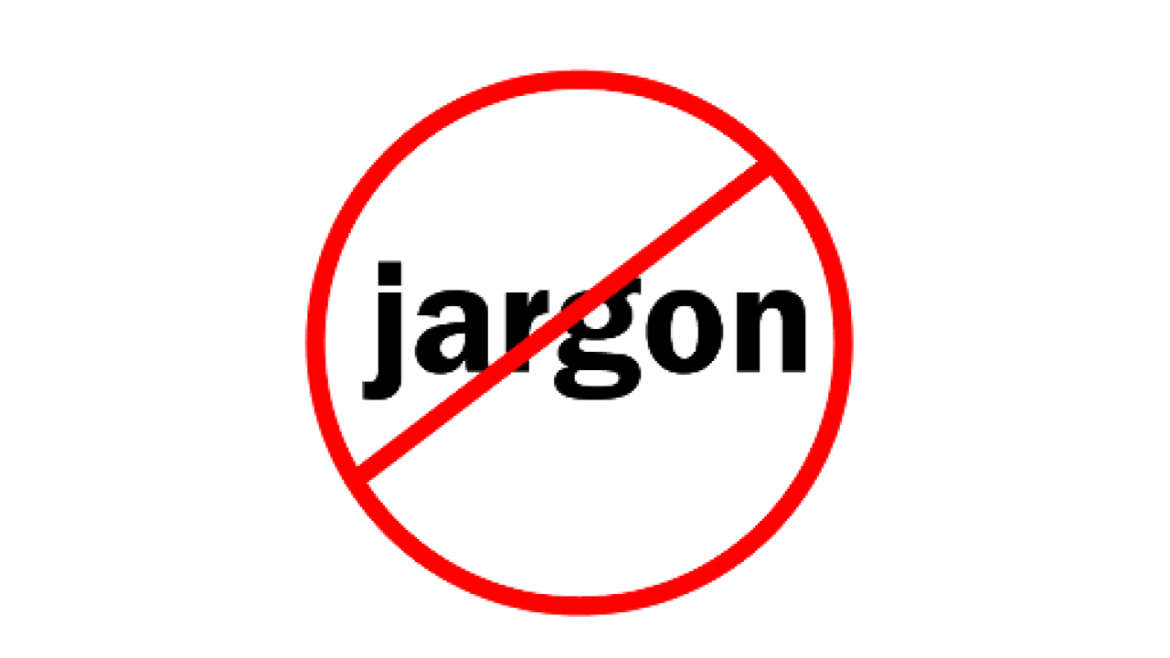If you want to be understood, stop doing this crap NOW!
“We want to talk right down to earth in a language that everybody here can easily understand.” –Malcolm X
Consider these common examples of corporate-speak and military-speak.
“We are going to triangulate with Jim over in AP before moving forward.”
“Our T & E is trending above plan for CY 2014”.
“Utilize your SINCGARS for this week’s field ex.”
Below, I have provided explanations of what these things mean.* Please read them before proceeding.
Now, let’s talk about jargon and acronyms.
Jargon is specialized language. It is specialized for an industry or activity. For example, “touchdown” is specialized for scoring in football. It is also specialized for weather, describing where a tornado may land. It is also specialized for aviation, describing the point where an aircraft actually touches the ground when landing.
That is a simple example, but people who are engineers or information technology people have their own vocabulary too. Every industry and profession does. It may be something they use every day, but to others, it is unfamiliar.
Acronyms are specialized abbreviations. They are all around us. We all know what USA stands for. But we don’t all know what OPEC is. It means Organization of Petroleum Exporting Countries, which is a group of countries with large oil resources that collaborate on production and prices.
You must take time to help your audience or reader understand you. You must check for understanding when communicating about something specialized.
I met with an engineering firm owner who drastically needed to improve his sales. Together, we looked at his website. It was full of jargon and acronyms such as “VRS Portable System” and “Turnkey SCCT Enclosure”. There were virtually no explanations of what these things were, what they did, or how they might benefit a buyer.
I have no clue what those things are. Many of his prospective customers probably don’t, and there may be people who work with him who don’t know either.
I had to explain to the man that if people were not sticking around to read the rest of the site, much less become customers, that it was HIS fault, not theirs.
It is not the job of your customers, your employees, your boss, your investors, or your audience to figure out what you mean without help from you. It is your duty to them to make it understood as easily as possible.
Have you ever read a book or report and realized that you reached the end of the page and could not remember what you read? If you did, it is because you went past a word or symbol that you did not understand. In fact, the moment you go past a word or symbol that you don’t understand, you go blank.
Conversation works the same way. As soon as someone utters a word or phrase that you don’t understand, you tune out while your mind tries to decipher something new and unfamiliar.
If you talk to people using jargon or acronyms that you know and they don’t, you have lost your audience. You are talking in a way that is comfortable and familiar to you, but creating barriers to understanding for your audience.
If you use jargon or acronyms on your website, in an e-mail, in a press release, or anywhere else, you are going to lose most of your readers. You are a lot less likely to sell them anything if they don’t understand you.
Do you get it now? I am going to say this in the strongest possible terms. Use of jargon and acronyms is a very lazy form of communication. Do you want to lose your reader because you were too lazy to take a few extra seconds to spell it out? SPELL IT OUT!
“If the orders are unclear, it is the commander’s fault”. – The Art of War by General Sun Tzu
During my years of military service, I have heard people of all ranks issue orders that were full of jargon and acronyms. Then, I would watch these same people express frustration when things went wrong, blaming “incompetence” or “poor training”. It never dawned on them that their communication style just might be an issue and that they failed to make things clear.
If you are a leader, you must express yourself clearly. That applies to any setting or situation. Jargon is not clear prose. It is lazy, pompous and hollow communication.
If you speak using jargon or acronyms, you have no right to complain if your thoughts are not understood. You have no right to complain if your instructions are not carried out as you hoped. Even your employees may not understand. You could have someone working with you who is new to your business, but is afraid to ask questions out of fear of appearing ignorant.
If you use jargon and acronyms and actually expect to be understood, you suck as a communicator. And if you suck as a communicator, your effectiveness as a leader is quite limited. Consider yourself warned.
Jargon and acronyms are certainly fine in some circumstances. As long as you are certain that everyone that you are addressing understands you, then use them. Here are some guidelines to be a more effective communicator and leader.
1. If the little voice in your head prompts you to check for understanding, then check for understanding. If your audience seems distracted or distant, that is a sign that you may need to check for understanding.
2. When writing, the rule for acronyms is to spell it out on first use, then you can use the acronym throughout. It is acceptable under Associated Press (AP) journalism guidelines to put the acronym in parentheses and then to use the acronym throughout. The AP Stylebook is a helpful guide for acronyms and abbreviations.
3. Do not use jargon. Instead of saying, “This program is geared towards the end-user”, say “This program was developed specifically for the needs of the customer”. Train your suspicion to alert you if what you are saying or writing may not be quite clear. If you were hearing it for the first time, would it be clear to you?
4. If someone is speaking and they say something that you don’t understand, stop them and ask for clarification. Same with written communication you receive. Ask for the answer.
5. Some acronyms are widely understood, such as TV, AM, PM, or USA. Generally, those do not require explanation.
6. Don’t try to prove that you have good inside knowledge by using jargon or acronyms. It is likely to be viewed as a sign of poor communication skills. Do not use jargon in a press release, on a resume, on your website, your social media, your blog, or anything that is viewed by the public.
7. Do not use jargon or acronyms in a media interview.
Use plain English and full titles in business communication and always err on the side of total clarity.
*Explanations of jargon and acronyms used.
Malcolm X (1925-1965) – civil rights leader.
Triangulate – Involving a third person in a conversation.
AP – Accounts Payable. Balances due a creditor for delivered goods or completed services.
T&E – Travel and Entertainment. Funds spent for travel or entertainment.
Trending above plan – Increasing past a budgeted or projected amount.
CY – Calendar Year
Utilize – Use.
SINCGARS – Single Channel Ground and Airborne Radio System. SINCGARS is a radio communication system in wide use by U.S. and allied military forces.
Field ex – Field Exercise.
Sun Tzu (544-496 BC) Chinese general and philosopher.




